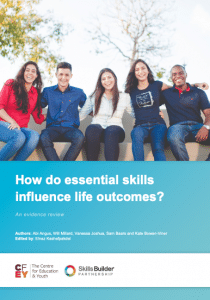How do essential skills impact on young people’s life outcomes?
by Abi Angus
1st October 2020
We’re excited to be publishing new research on essential skills today with the Skills Builder Partnership.
The research set out to explore the relationship between young people’s skills development and life outcomes, in terms of their educational attainment, employment prospects, and social and emotional wellbeing, based on a rapid review of existing literature.
To make our conclusions as transparent as possible we built our evidence review on pre-specified search terms and inclusion criteria, using an existing framework to screen literature based on the methods it used and the robustness of its findings. As is always the case when you’re conducting a literature review, we found that existing evidence in this area is something of a mixed bag. Some studies did not make it clear whether they were interrogating the relationship between skills-focused interventions and outcomes, or the possession of certain skills and outcomes. Meanwhile, while some studies were able to make causal claims about the link between particular interventions, the development of certain skills, and outcomes, many were not able to draw this link.
Out today, new research conducted by @TheCFEY in partnership with @Skills_Builder exploring the relationship between #essentialskills and young people's life outcomes. You can read the report here: https://bit.ly/3ieSD3I Share on XWhat did we find out?
Overall, we found some evidence that some skills, including listening, staying positive and teamwork, can support young people’s academic outcomes, resulting in improved reading and writing skills, as well as wider measures of attainment.
We also found evidence that the development of skills such as talking, listening and perseverance can positively influence young people’s employment prospects.
The literature we found indicates that interventions focused on pupils’ social and emotional skills, such as teamwork and communication, can improve children and young people’s emotional and social competencies. These competencies support self-regulation and relationship building, and can result in positive outcomes relating to wellbeing.
How do #essentialskills relate to young people's wellbeing? Find out by reading @TheCFEY and @Skills_Builder's exciting new report. Read more here: https://bit.ly/3ieSD3I Share on XWhat does this mean for research and practice?
In the report, we also look at implications for research and practice.
We highlight the need for future research to unpick the features of skills-focused interventions that result in benefits for young people. In other words, the ‘how’. We also emphasise a shortage of longitudinal research that tracks outcomes over time, and which focuses on younger children as opposed to university students and recent graduates. Research could also examine the opportunity costs of focusing on certain skills over others.
In terms of practice, the evidence base is short of causal links and, therefore, prescriptions for action. However, the literature we reviewed indicates a correlation between positive outcomes for young people, and activities that are:
- Structured: breaking skills down into chunks, highlighting what ‘success’ looks like, and helping children and young people identify how they can improve
- Supported: giving teachers and other adults working with children and young people the resources and training they need to implement essential skills teaching effectively
- Targeted: ensuring that children and young people who need additional help get it, and that the teaching of skills is responsive to needs
You can download the full report, here.


Comments